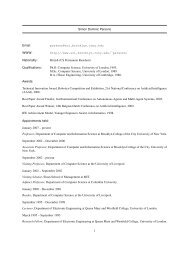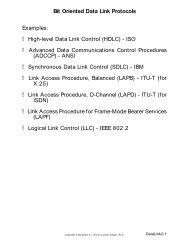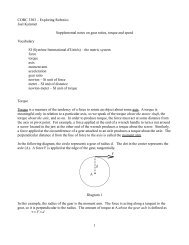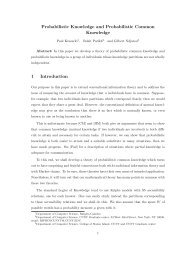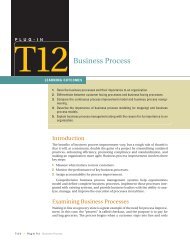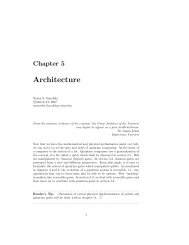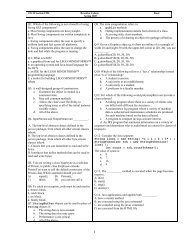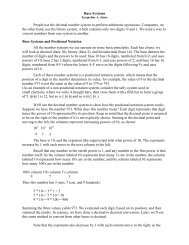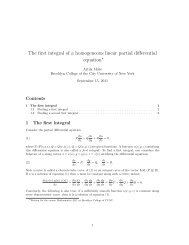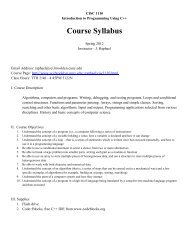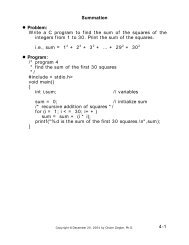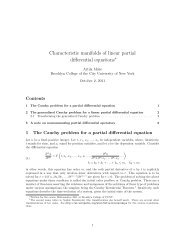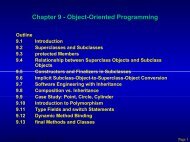*302 Greig and Others v Insole and Others 1977 G. No. 22461977 J ...
*302 Greig and Others v Insole and Others 1977 G. No. 22461977 J ...
*302 Greig and Others v Insole and Others 1977 G. No. 22461977 J ...
You also want an ePaper? Increase the reach of your titles
YUMPU automatically turns print PDFs into web optimized ePapers that Google loves.
[1978] 1 W.L.R. 302 Page 37<br />
[1978] 1 W.L.R. 302 [1978] 3 All E.R. 449 (1978) 122 S.J. 162 [1978] 1 W.L.R. 302 [1978] 3 All E.R. 449 (1978)<br />
122 S.J. 162<br />
(Cite as: [1978] 1 W.L.R. 302)<br />
<strong>1977</strong>, or subsequently. If there had been an active<br />
desire on the part of the ICC not to interfere with<br />
such contracts more than was justifiable, it might<br />
reasonably have been expected to ask for copies of<br />
the contracts from World Series Cricket or its solicitors,<br />
explaining why it required them. Its failure<br />
to do so provides a further indication that, prompted<br />
by an optimistic (but unsubstantiated) belief on<br />
the part of some of its members that the contracts<br />
were probably voidable, the ICC thought it unnecessary<br />
to give very much thought to the possibility<br />
that, in passing the proposed resolutions, it might<br />
be infringing the rights of World Series Cricket.<br />
In my judgment the defence of justification<br />
fails. Accordingly, I answer question (B) above<br />
by finding that, subject to any statutory immunity<br />
which may be conferred on the ICC by the<br />
Trade Union <strong>and</strong> Labour Relations Act<br />
1974 , World Series Cricket had as at August<br />
3, <strong>1977</strong>, <strong>and</strong> still has a good cause of action in<br />
tort against the ICC based on inducement of breach<br />
of contract.<br />
XIII The claim of World Series<br />
Cricket against the TCCB based on alleged inducement<br />
of breach of contract: question (C) above<br />
I shall now consider the claims of World Series<br />
Cricket against the TCCB based on alleged inducement<br />
of breach of contract. I need not repeat the basic<br />
principles of law applicable in this context, but<br />
will proceed straight away to the five ingredients of<br />
the tort.(1)<br />
“Direct interference”<br />
In my judgment there has been direct interference<br />
by the TCCB with the contracts of World Series<br />
Cricket <strong>and</strong> its players. Apart from the other earlier<br />
resolutions of that body, the very terms of the resolutions<br />
passed by it at its meeting of July 15, <strong>1977</strong>,<br />
made it plain that in principle the TCCB contemplated<br />
<strong>and</strong> intended that (i) any player who did not<br />
withdraw from his contract with World Series<br />
Cricket before October 1, should be disqualified<br />
from Test cricket; (ii) any such player, who should<br />
be thus disqualified, should also be disqualified<br />
from county cricket as from the beginning of the<br />
1979 season. The one year's moratorium attached to<br />
this proposed county ban was removed when the<br />
proposed change of rules of the TCCB took its final<br />
form in August <strong>1977</strong>, but this is immaterial for<br />
present purposes.<br />
Though these resolutions were not followed<br />
by an immediate press announcement, the<br />
TCCB could reasonably have assumed that many of<br />
*343 the players concerned would<br />
learn of them through the representatives of their<br />
counties. Furthermore, at the subsequent ICC meeting<br />
on July 26, the chairman of the TCCB himself<br />
advocated the policy which had been formulated by<br />
the TCCB.<br />
These actions of the TCCB, by proposing (i) a Test<br />
Match ban on the players who had contracted with<br />
World Series Cricket, the operation of which was to<br />
be deferred until October 1, <strong>and</strong> (ii) a deferred ban<br />
at county level on players who should fall under the<br />
Test Match ban, were calculated to cause all <strong>and</strong><br />
doubtless did cause at least some of those players<br />
who were otherwise eligible to play in Test cricket<br />
<strong>and</strong>/or county cricket to consider withdrawing from<br />
their contracts with World Series Cricket. In my<br />
judgment, the TCCB in passing the resolutions<br />
which it passed on July 15, <strong>and</strong> forwarding their<br />
implementation through the medium of their chairman<br />
at the ICC meeting on July 26, was applying<br />
pressure or persuasion to the minds of all cricketers<br />
who had contracted with World Series Cricket but<br />
wished to remain eligible to play official Test <strong>and</strong>/<br />
or county cricket, to withdraw from their contracts.<br />
It faced <strong>and</strong> was calculated to face the players concerned<br />
with an acute dilemma, “Get out of your<br />
contracts by October 1, <strong>1977</strong>, or be banned.” This<br />
offer of an opportunity to the players to withdraw<br />
from their contracts, coupled with a sanction if they<br />
failed to do so, in my judgment, amounted to an attempted<br />
inducement to them to withdraw.<br />
Direct interference with such contracts by the<br />
© 2011 Thomson Reuters.



